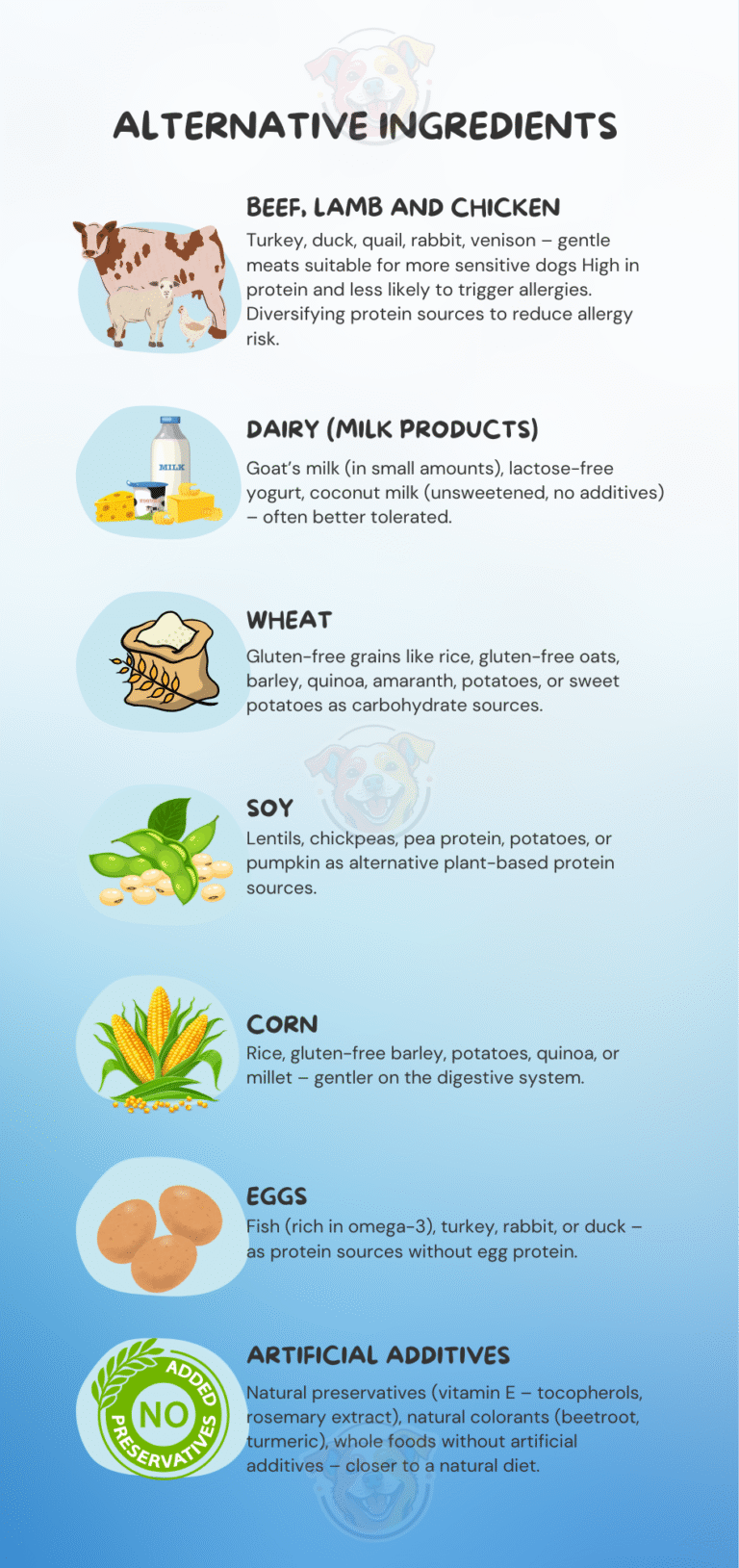Home August 12, 2025 admin@mypupease.com 7 min read Disclaimer: We’re not vets. My PupEase provides educational content only. For proper...
Does your dog seem itchy all the time or get an upset tummy after meals? As a concerned dog parent, you might be wondering if something in their food is causing those problems. Dog food allergies are more common than you might think, and figuring them out can feel overwhelming.
In this friendly guide, we’ll walk through which dog food ingredients to avoid for allergies, how those ingredients cause reactions, and what you can do to keep your pup happy and allergy-free. Consider this a chat with a friend who’s learned a lot about dog allergies – by the end, you’ll know how to spot allergy triggers, read food labels like a pro, and choose safer foods for your furry friend.
Ready? Okay, let’s go!

What exactly is a dog food allergy?
A dog food allergy happens when your dog’s immune system mistakenly attacks a normal ingredient, usually a protein, as if it were dangerous. This immune reaction releases chemicals like histamine, which cause symptoms such as itching, stomach upset, or ear infections.
💡 Example: Your dog’s immune system is like a guard dog. With an allergy, it starts barking at something harmless like chicken or beef, thinking it’s an intruder.
Food allergies: Involve the immune system and often cause skin issues alongside digestive problems.
Food intolerances: Usually just affect digestion and don’t trigger an immune response.
Either way, the solution is often the same: avoid the offending ingredient.

Look out for these signs of dog food allergy:
Persistent itching and scratching (especially paws, belly, face, ears, rear end)
Frequent ear infections
Hot spots, rashes, or hair loss
Digestive problems (diarrhea, vomiting, gas)
Anal gland issues
Real-life example:
Max, a 4-year-old Labrador, had chronic ear infections and hot spots. His owner switched him from chicken-based kibble to a salmon and sweet potato diet. Within weeks, his skin cleared, and the ear infections stopped. The culprit? Chicken allergy.

The following are the most common dog food ingredients to avoid for allergies:
The #1 dog food allergen (about 34% of cases). Causes skin irritation, ear infections, and digestive upset.
A frequent trigger (about 15% of cases). Often cross-reacts with turkey and other poultry.
Causes itchiness and digestive trouble. Found as milk, cheese, whey, casein.
Some dogs react to the gluten protein in wheat. Can cause itchy skin or soft stools.
Plant protein that may cause itching, ear problems, and stomach upset.
Less common, but some dogs react to it. Look for skin or digestive symptoms.
Allergic reactions usually to egg whites. Found as dried egg product in many foods.
Can cause allergies, especially in beef-sensitive dogs.
Preservatives, colors, and flavors can cause intolerance reactions. Best to avoid.

When checking dog food:
Check the first 5 ingredients — they make up most of the food.
Learn allergen aliases (e.g., dairy might appear as “whey” or “casein”).
Avoid vague terms like “meat meal” without specifying the animal.
Check treats and supplements too — they often hide allergens.
Options for hypoallergenic dog food include:
Limited Ingredient Diets (LID) – fewer components, easier to identify allergens.
Novel Protein Diets – proteins your dog hasn’t eaten before (duck, venison, kangaroo).
Hydrolyzed Protein Diets – proteins broken into small fragments so the immune system won’t react.
Fresh or Home-Cooked Diets – full control over ingredients, best done with vet guidance.

Rotate proteins periodically to reduce risk.
Choose high-quality, natural foods without unnecessary additives.
Support gut health with probiotics and skin health with omega-3s.
Stick to measured meals, not free-feeding.
Consult a vet if your dog has:
Ongoing itchiness or digestive issues
Frequent ear or skin infections
Symptoms not improving with diet change
Your vet may recommend an elimination diet — the gold standard for diagnosing food allergies.
The most common dog food allergens are beef, chicken, dairy, and wheat.
Learn to read dog food labels to spot hidden allergens.
Hypoallergenic diets can dramatically improve your dog’s comfort.
Managing allergies is about consistent vigilance and informed choices.
American Kennel Club – Dog Food Allergies Overview
VCA Hospitals – Food Allergies in Dogs
Adopt Smart
We’ve put together the most important info you should know — plus the latest facts on today’s most popular breeds!
Studies show that many commercial dog foods contain allergens, fillers, and low-quality proteins. Even “premium” labels can be misleading.
Most chronic itching, ear infections, or paw licking are signs of food allergies — not dirty fur or bad habits.
Home August 12, 2025 admin@mypupease.com 7 min read Disclaimer: We’re not vets. My PupEase provides educational content only. For proper...
More Articles Why Is My Dog Scratching So Much? Dog Food Ingredients to Avoid for Allergies August 12, 2025 admin@mypupease.com...
New Articles Why Is My Dog Scratching So Much? Dog Food Ingredients to Avoid for Allergies August 12, 2025 Dog...
August 12, 2025 9:10 pm Does your dog seem itchy all the time or get an upset tummy after meals?...
Empowering dog owners with proven solutions for allergies, nutrition & overall dog health.
© Copyright 2025 My PupEase –
All Rights Reserved.